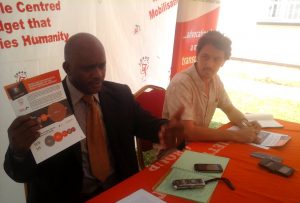Citizens query government spending priorities

Mukunda displays the findings of their recent poll that contains the views of respondents who mostly wanted more spending for education, health and agriculture.
February 2— The government has been asked to reassess its expenditure priorities to ensure the interests of the majority of the citizens are catered towards improving the quality of life and lifting millions of Ugandans out of poverty.
At present 19% of Ugandans live below the poverty line in a population of 39 million.
The Civil Society Budget Advocacy Group Coordinator, Julius Mukunda said, “It is vital for citizens to shape budget priorities to ensure public expenditure is in tandem with their needs. Failure to involve the local people is violation of their rights since the Constitution calls for it.”
Holding a news conference this week, Mukunda laid out the CSBAG view on the proposed budget for financial year 2018/2019. He said on several occasions the government allocates huge resources in sectors that are not directly beneficial to large pockets of the population. The national budget for 2017/18 was just over $8 billion.
CSBAG is a coalition formed in 2004 to bring together CSOs at national and district levels to influence Government decisions on resource mobilization and utilization for equitable and sustainable development.
CSBAG recently completed a mini pre-budget poll that sought and highlighted citizens’ most critical needs. It was spread over 115 districts across the country and divided in nine sub-regions to provide a platform for citizens to air their concerns.
Most respondents want the government to increase investment in social services, such as education, health and agriculture. On the infrastructure side, only 15.5% are interested in governments investing in roads and energy but currently to about 53.67% of the national budget is going towards these projects
According to Mukunda, there is a mismatch between the government’s planned expenditure and the citizen’s most pressing needs. The results could offer some insights into why about 3.4 million Ugandans slipped into poverty between financial year 2012/2013 and financial year 2016/ 2017.

 African Heads of state head to South Korea next week for Summit talks
African Heads of state head to South Korea next week for Summit talks
 Trading leads as main source of income for Ugandans
Trading leads as main source of income for Ugandans
 New leadership for bankers’ umbrella as total assets top $12 billion
New leadership for bankers’ umbrella as total assets top $12 billion
 Brussels Airlines to announce Nairobi service
Brussels Airlines to announce Nairobi service
 SITA promises enhanced travel experience after Materna acquisition
SITA promises enhanced travel experience after Materna acquisition
 Saudia’s 105 aircraft order stretches A320neo lead over rival Max
Saudia’s 105 aircraft order stretches A320neo lead over rival Max
